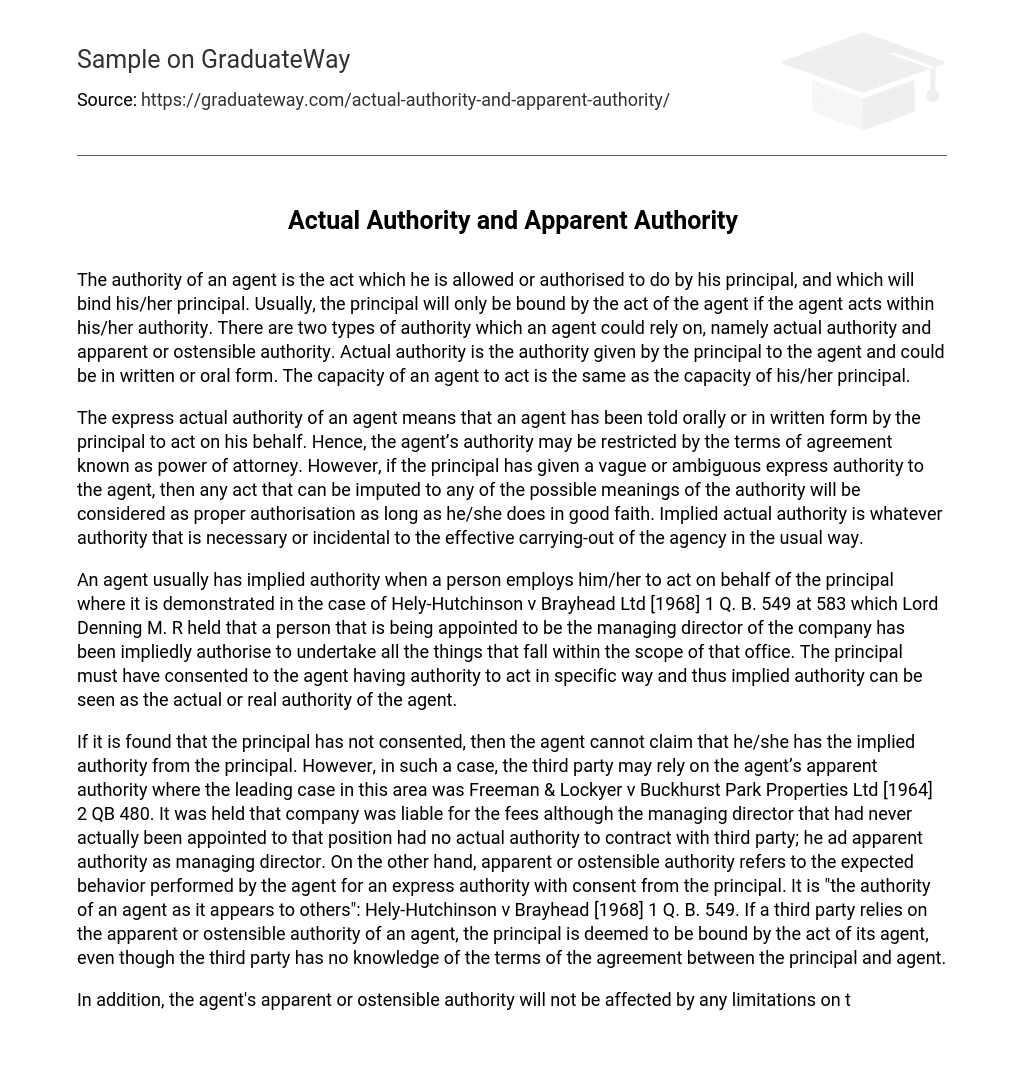The authority of an agent refers to the actions they are permitted or authorized to take on behalf of their principal, actions that will legally bind the principal. Generally, the principal is only bound by the agent’s actions if they are within the agent’s authority. There are two types of authority that an agent may rely on: actual authority and apparent or ostensible authority. Actual authority is granted to the agent by the principal and can be in written or oral form. The agent’s ability to act is equal to that of their principal.
The express actual authority of an agent refers to when the principal orally or in writing instructs the agent to act on their behalf. This authority can be limited by a power of attorney agreement. However, if the principal gives vague or unclear instructions to the agent, any action that can be justified based on any possible interpretation of the instructions will be considered proper authorization if done in good faith. Implied actual authority includes any authority necessary or incidental to effectively fulfilling the obligations of the agency in the usual manner.
An agent typically possesses implied authority when they are hired to act on behalf of the principal. This concept was illustrated in the case of Hely-Hutchinson v Brayhead Ltd [1968] 1 Q. B. 549 at 583, where Lord Denning M.R clarified that an individual appointed as the managing director of a company is implicitly authorized to perform all tasks within the scope of that position. For implied authority to exist, the principal must have given their consent for the agent to act in a specific manner. Implied authority is therefore considered the agent’s actual or real authority.
If the principal does not give consent, the agent cannot claim implied authority from the principal. However, in such cases, the third party can rely on the apparent authority of the agent. The leading case in this area is Freeman & Lockyer v Buckhurst Park Properties Ltd [1964] 2 QB 480. It was decided that even though the managing director, who was not officially appointed, had apparent authority as a managing director, the company was still responsible for fees.
Apparent or ostensible authority refers to how an agent with express authority and consent from the principal is expected to behave. Hely-Hutchinson v Brayhead [1968] 1 Q.B. 549 defines it as “the authority of an agent as it appears to others.” If a third party relies on an agent’s apparent or ostensible authority, regardless of whether they are aware of any agreement between principal and agent, then the principal is obligated by the actions taken by their agent.
Furthermore, the agent’s authority, whether it be actual or apparent, is not impacted by any restrictions on their actual authority that the third party may be unaware of. Usually, the principal can notify the third party about someone having the power to act on their behalf. Nonetheless, in numerous instances, the apparent authority is deduced from the agent’s conduct, such as designating an individual as a Managing Director in the principal’s company.
It is possible for a third party to mistakenly believe that someone has the power to make contracts on behalf of another person, without being aware of any limitations. This was shown in the case of Panorama Developments (Guilford) Ltd v Fidelis Furnishing Fabrics Ltd [1971] 3 All E. R. 16, where a company became legally bound by an agreement because their company secretary rented vehicles for personal use, based on what seemed to be authority granted to them. The company secretary, who holds the position of chief administrative officer, possesses all authorities associated with that role.
Principal can only be bound by the acts of an agent that fall within their apparent authority. However, there are situations where the principal can still be bound by the agent’s acts even if they acted outside their authority. An agent who holds a specific position in an office can have both actual and apparent authority. As a result, the agent’s apparent authority is wider than their actual authority. Despite the agent being restricted by their actual authority, the principal is still obligated by the agent’s acts, as seen in the case of Waugh v H. B.
The case of Clifford & Sons Ltd [1982] 1 Ch 374 established that the client must accept the compromise made by the solicitor, regardless of their personal preferences. Additionally, the agent is granted authority to sell a property on behalf of the principal and provide descriptions to potential buyers. However, if these descriptions contain false information, it is the responsibility of the principal for any actions taken by the agent. This matter was addressed in Aliotta v Broadmeadows Bus Service Ltd (1988) A.T.P.R. 40 – 873, where it was determined that the agents had deceived the plaintiff through deliberate omission of vital details.
An agent with apparent authority cannot delegate such authority to another person. In Crabtree-Vickers Pty Ltd v Australian Direct Mailing Advertising and Addressing Co Pty Ltd (1975) 133 CLR 71, it was established that Peter had no contractual rights since he did not hold an official title within the company, and BJ also lacked the actual authority to enter into a contract with a third party. Therefore, no contract was formed. In summary, an agent must operate within their authorized limits as the principal will not be bound if the agent exceeds their authority.





